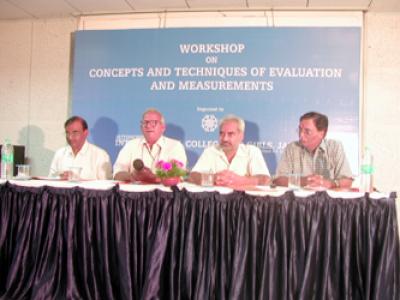National workshop on ‘Concepts and Techniques of evaluation and measurement’

Faculty of Commerce & Management organized a two day National workshop on ‘Concepts and Techniques of evaluation and measurement’ during Sept 20-21, 2008 in ICG campus.
After the welcome note by Dr. Raakhi Gupta, Principal of the college, the inaugural session had Prof. P. K. Tulsi as the keynote speaker who presented her expert views on the topic ‘Enhancing reliability and validity of student evaluation’. While expatiating on the topic she apprised the delegates with the current education system and the status of higher education in India. Stressing on the need for the overall development of the student, she mentioned that knowledge, comprehension ability, application of knowledge and analytical skills is what every student must possess. Focusing further on the topic she highlighted various shortcomings and common errors being left unattended by the examiners in the question papers set by them. She stressed on the need to set the question paper covering the entire syllabus rather than just those units of syllabus that the examiner is comfortable with. She provided vital information with regards to the techniques of evaluation and the steps in setting a question paper. The session ended with a formal vote of thanks by Prof. M. K. Sharma, Dean, Faculty of Commerce in the college.
The second session was chaired by Prof. Mushtaque Ahmad, Principal in GLA Group of Institutions, Mathura, who shared his valuable experiences with regards to setting question papers during his tenure of more than three decades at Aligarh Muslim University. He reminded the teachers that they are the nation builders and that they shape the nation. According to him the hard labor with the students brings its own rewards. Sharing his experiences on paper setting he highlighted that the purpose of setting question paper should not be to exhibit the paper setter’s own knowledge, rather it should be aimed at testing student’s knowledge.
The session had a dynamic lecture by Prof. R. D. Sharma, who stressed on the application of practical knowledge by the faculty on the job. He highlighted the issue of political interference in paper setting as well as evaluation, and stressed on the need for empowering the faculty to counter such pressures. He also laid emphasis on lowering the student teacher ratio in the classes to increase the efficiency and effectiveness of the teacher.
Prof. Prashant Kumar, a veteran academician with 3 decades of experience in teaching, while expressing his views mentioned three major components of a successful educational system. According to him these components included the facilities provided by the management, the intellectual level of teachers in the institution and the quality of students admitted for the courses. He stressed on the need for a detailed syllabus and a databank for the teachers. He further mentioned that the teachers are not being given adequate time to prepare question papers, which results in flaws in the paper. He emphasized on need of hardwork on the part of teachers to enable them to evaluate and measure student’s performance genuinely.

